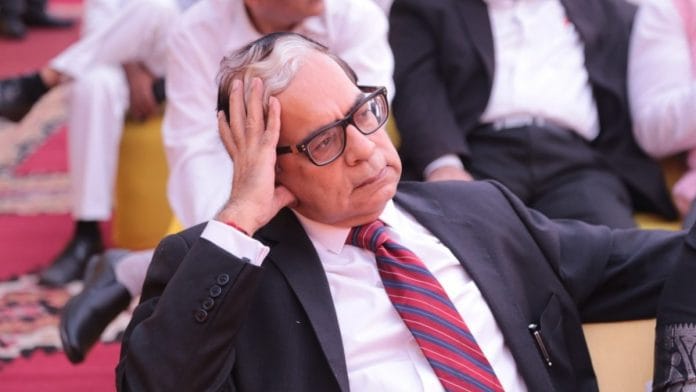New Delhi: To say Justice Arjan Kumar Sikri had a stellar record as a student would be an understatement of vast proportions.
According to his profile on the Supreme Court website, from Class IX till he completed his LLM, the Law Faculty alum received scholarships every year.
And by his own admission, it is with this zest of a student that he has lived his life, “sitting with an open mind and treating yourself as a student who is still learning… even on the dais in court”.
Justice Sikri, the second-most senior judge of the Supreme Court, retires Wednesday, drawing the curtains on a notable career that has by and large been free of controversies.
A lawyer for 22 years, Justice Sikri became a judge in 1999, when he was elevated to the Delhi High Court. In his judicial stint since — which has included a tenure as Chief Justice of the Punjab and Haryana High Court — he has notched a total of 4,570 judgments.
He is the third judge of the apex court to retire since Chief Justice of India Ranjan Gogoi took charge less than six months ago. This is significant since the composition of the collegium — tasked with judicial appointments to the Supreme Court and the high courts, and comprising the top five judges of the apex court — has almost completely changed over the past few months.
Also read: Justice AK Sikri turned down Commonwealth post. Here’s what he has lost out on
Notable orders and judgments
One of Justice Sikri’s most notable judgments at the Supreme Court came as he joined a Constitution bench looking into a vexed issue that has dogged Delhi, where he was born and raised, for decades: The exact balance of power between the Centre, represented by the Lieutenant Governor (L-G), and the local administration.
Reiterating the constitutional provision to this effect, the bench had ruled last July that the L-G was bound to listen to the “aid and advice” of his council of ministers, who were elected representatives of the electorate.
However, as part of a division bench adjudicating on associated matters earlier this year, Justices Sikri and Ashok Bhushan had different views and failed to settle the long-running dispute between the Centre and Delhi over the control of services in the national capital territory.
Justice Sikri was also part of the Constitution Bench that ruled in favour of Aadhaar last September even as it struck down the contentious Section 57 of the Aadhaar Act, which allowed not only the state but also corporate or private entities to demand someone’s unique ID.
In the majority opinion penned by Justice Sikri, the apex court said the biometric identification system empowered the marginalised sections of society, but added that one did not need to link their SIM cards and bank accounts to Aadhaar.
It was a two-judge bench comprising Justice Sikri that approved the Centre’s draft of the much-awaited Witness Protection Scheme 2018 in December last year and directed its implementation across the country till Parliament came out with a law.
Another historic judgment to Justice Sikri’s name is the Constitution bench verdict from March last year that allowed passive euthanasia and the execution of a living will — this judgment allowed people suffering from terminal illness and likely to slip into a vegetative state to draft a will while conscious, dictating whether they would want to be taken off life support.
In May last year, Justice Sikri had led a Supreme Court bench that ordered an immediate floor test in Karnataka after the assembly election threw up a fractured mandate, cancelling the 15-day window given by the governor to the Bharatiya Janata Party (BJP).
The BJP, the single-largest party, had staked claim to form the government. However, later, unable to prove its majority, the day-old B.S. Yeddyurappa government had resigned, paving the way for a Congress-JD(S) coalition to assume office.
Also read: After ThePrint report, SC judge Sikri rejects Modi govt’s post-retirement job offer
The sole controversy
Justice Sikri’s tenure as a judge has largely been controversy-free. However, he courted some controversy in January, after ThePrint reported that he had been nominated by the Narendra Modi government for a post-retirement job with the London-based Commonwealth Secretariat Arbitral Tribunal (CSAT).
The report came soon after a three-member high-powered panel, comprising PM Narendra Modi, leader of the largest opposition party in the Lok Sabha, Mallikarjun Kharge of the Congress, and Justice Sikri, decided to dismiss Alok Verma as CBI director with a 2:1 majority, with the Supreme Court judge offering the same opinion as the Centre.
The panel had been tasked by the Supreme Court to take a call on Verma’s fate.
Justice Sikri withdrew his consent hours after the report was published.






